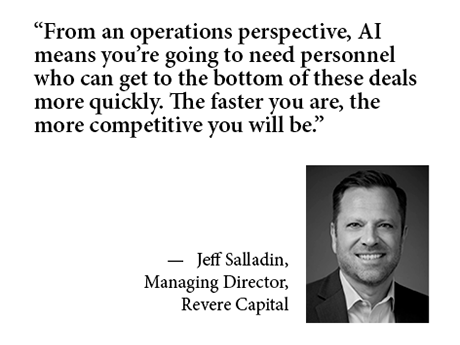The emergence of generative artificial intelligence (AI) promises to greatly expand the property industry’s reach and abilities. Generative AI can offer suggestions, compile reports and create various types of content, ranging from video to software code.
In the commercial real estate world, generative AI has the potential to harness myriad information to help owners, managers, lenders and investors assess portfolio performance, uncover operating risks and identify opportunities, among other activities, says Jeff Salladin, a managing director with Dallas-based private debt fund Revere Capital.
But companies need to begin preparing for it now, he adds. “Commercial real estate can be slow to change — it wasn’t that long ago that mortgage brokers were sending us deals via overnight mail,” observes Salladin. “But whether they’re analysts or leadership teams, someone in your shop should be dipping their toe in the water and testing out AI.”
Salladin also points out the need to proceed cautiously with this new technology as it evolves. Humans with expertise need to review what AI generates for the commercial real estate field. AI can narrow the focus of many tasks but cannot substitute for human reviewers or the human ability to critically apply information gleaned.
AI Benefits
Salladin predicts that of the many ways in which AI will impact commercial real estate, the following three are of particular note for finance companies:
- Predictive analytics. AI can help lenders identify demand for various property categories by crunching data related to population and demographics, construction permits, occupancy, rental rates and trends, the age of the surrounding stock and other metrics.
- Due diligence. Revere recently closed a multifamily land deal in Austin. While the sponsor provided information, Revere also used an AI program to take a deeper dive into the data and expedite its due diligence.
“You can do similar research with a Google search, but you typically have to sift through the results to find the relevant information,” explains Salladin, referring to his experience with the AI program. “With AI, within seconds you get a summary of several paragraphs with different footnoted articles and other pieces of relevant research, all in one place.”
- Financial modeling. Lastly, AI can build financial models, which is especially useful for organizations that may have limited coding or technology bandwidth, Salladin reports. In turn, that can speed up decision-making and reviews in three important areas. The first two — modeling a new deal in the origination process and modeling an evolving deal as part of the asset management process — typically apply to individual loans and save time early in the process for the human beings who will review the deal later.
The third avenue, portfolio management, may prove the most valuable. Reviewing individual files to manage portfolios today can be slow and labor intensive, Salladin notes. Not only can AI free up those resources to perform more material tasks, but it can also help banks and other lenders with hundreds of loans instantly spot broader portfolio trends less apparent to the naked eye.
Given the growing view that interest rates will be higher for longer — and that the Federal Reserve is not likely to return to a zero-interest-rate policy — all of these advantages driven by AI will play a vital role in keeping commercial real estate lenders competitive in an era of constrained cash flow, Salladin predicts.
“From an operations perspective, AI means you’re going to need personnel who can get to the bottom of these deals more quickly,” he said. “The faster you are, the more competitive you will be.”
Fragmented and Fluid
An organization’s size and how much data it generates are a couple of characteristics that will guide a real estate firm’s adoption of AI. Additionally, different businesses in the industry will have different AI needs. Property owners and managers will have greater lease administration requirements than lenders, Salladin points out.
AI uptake also hinges on the maturation of the AI industry itself. Venture investments in generative AI startups more than quintupled in 2023 to nearly $22 billion versus 2022, according to CB Insights, a technology research organization and consultancy. Meanwhile, the number of companies receiving funds grew to 426 from 257 over the same period, and two-thirds of those companies were early-stage startups.
Such characteristics suggest growing pains ahead. Consequently, commercial real estate firms should carefully select AI vendors or partners, as some entities may not be around for long, Salladin advises. He also acknowledges that while AI is another tool that can enhance efficiency, humans will be the final arbiter on how to use its insights.
“At the end of the day, people are still going to gather around a table and decide whether we should do a deal,” he says. “We’ll just get there more quickly and with more complete information with AI.”
— By Joe Gose. Revere Capital is a content partner of REBusinessOnline. For more information about the content partner program, click here.


